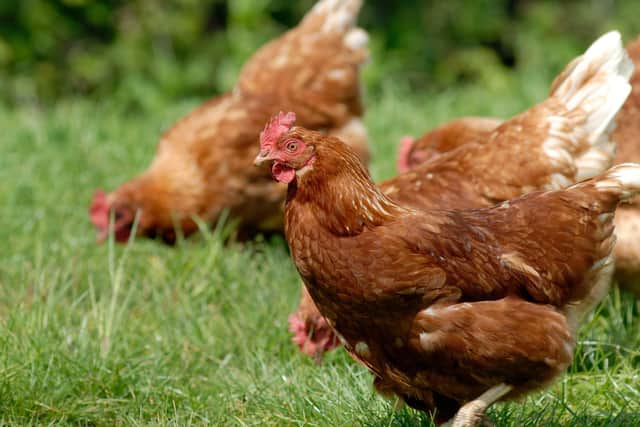Farming is in a desperate state, it needs greater Government support - Max Anderson
Interestingly, Labour and the Lib Dems have noticed farmers’ dismay. With Sir Keir Starmer speaking at the NFU Annual Conference and Ed Davey driving tractors into bright blue hay bales for the local elections, they will be hoping their political posturing will tempt desperate farmers away from voting Tory. But, the problem is more serious than a simple political opportunity - if the Government doesn’t take real action to support farmers and their communities, British farming might be perilously stunted.
A close inspection of the industry, particularly poultry, shows clearly how the sector is struggling.
Advertisement
Hide AdAdvertisement
Hide AdLet’s start by looking at the avian influenza ‘bird flu’ outbreak. In the build-up to last Christmas, a common headline was: ‘Turkey farmer forced to get another job after losing his flock of 10,000 to bird flu’. This is because we, like most European countries, experience seasonal bird flu when wintering waterfowl populations return to Britain. If a single bird is found to be carrying the virus, a farmer's entire flock must be culled, devastating their livelihoods.


But now, farmers are going through the “worst ever outbreak of bird flu”. This is because the virus, which has traditionally been carried by migrating birds, is now spreading at an unprecedented rate through Britain’s native bird population.
The threat of bird flu now circulating all year round should not be underestimated. Not only are the chances of infection, and the subsequent culling, of farmers' flocks greatly increased, but even if a farmer is fortunate and their flock doesn’t catch the virus, the extreme burden and financial stress can be too much.
For example, to prevent the spread of infection, the Government ordered all birds to be kept inside, losing birds' free-range status. Many farmers were also forced to slaughter and freeze their birds. Unfortunately, non-free-range, frozen chicken doesn’t exactly fly off the shelves.
Advertisement
Hide AdAdvertisement
Hide AdAdmittedly, some farmers have had some support to combat the bird flu epidemic. But, compensation is only provided for every bird which is uninfected. This means farmers who have had extensive outbreaks, which are becoming more common, are under-compensated. And, farmers who do not have an outbreak, but still experience financial stress, are not supported.
The disease has also combined with the effects of the war in Ukraine to hit farmers hard.
Recent failures to protect Britain’s food standards have also undercut farmers. Britain has always prided itself on having high-quality meat and well-protected animals. This is upheld by our farmers and expected in what we import. .
But revelations over the Food Standards Agency’s failure “to protect the public” has once again caused concern, with fraudulent labelling and “rotten meat” ending up on shelves.
Advertisement
Hide AdAdvertisement
Hide AdSince 2019, around 45,700 farmers left the industry. But those who have valiantly carried on, as we can see, are being pushed to the edge. Greater support is needed or we risk seriously undermining one of our most important industries.
Max Anderson is communications manager at think tank Bright Blue.